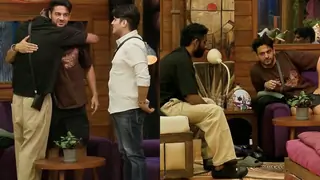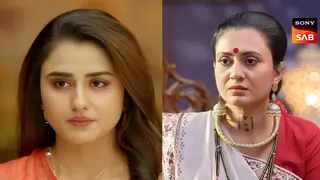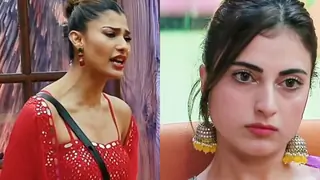Friends, I liked the episode today very much. Although the whole episode centred around this pregnancy issue in general, there wasn't just one single coherent thread running through the episode today. In fact, it seemed as if there were three separate scenes of fabulously executed characterisation, holding the episode together.
The first of the powerful scenes today was the Ruqaiya-Hoshiyar scene. The second one was the Jodha-Jalal-Ruqaiaya face-off scene. And the third one was that scene of Jalal being called upon to give justice at the Diwan-E-Aam to the man who was accusing his wife of adultery.
Why these three scenes seemed so powerful is because in each of these scenes the characters involved seemed to show us a new side of themselves. Certain sides of the people concerned had not been very clearly articulated earlier, and today's episode helped us understand them a lot better. We got some good insights into their inner motivations.
Without too much of a preamble, let me get to these scenes directly, so that you can all see if you agree or disagree with my views on these:
The Ruq-Hoshiyaar scene: Fairness that bodes well for the future
Almost at the beginning of the episode we were treated to an amazing scene between Ruquaiya and Hoshiyaar, where Ruquaiya was sitting in her usual arrogant posture. I thought were were going to be subjected today also to more of her arrogance. But the scene took a whole different turn when Hoshiyaar, wanting to flatter Ruq and boost her confidence made a terrible faux pas.
Hoshiyaar said: "Don't worry Ruquaiya Begum, you can still have your waaris and your Marium Uz Zamani title, if we can somehow neutralize this baby of Jodha's". Ruquaiya turned around sharply and breathed fire at Hoshiyaar! In one moment there, she became someone I wanted to know more closely, because she lost all hint of vampness and acquired the uncompromising face of forthrightness, fairness and justice!
She said an outright and vehement "No" to Hoshiyaar's plan, but she gave three reasons for this and each reason was very revealing in and of itself:
a. She said "No" because it was her Jalal's child! That was the Ruq we have all somewhat seen before as the defender of everything that belonged to "her Jalal", and this defence of what belonged to him seems to come straight from the loyalties of childhood friendship more than just the loyalties of being his wife.
b. She said "No" because she knew the pain a mother feels at losing a baby, having had a nasty miscarriage herself quite recently. Even here we all can believe we know this Ruq, because she showed nothing more than naturally deep empathy for another woman going through the same pains that she had experienced. Up till this point nothing Ruq said made us think differently of her than we have done before.
c. She said "No" because she did not think her ambitionns for a title and rank and status and a waaris should allow her to hurt anybody, not even Jodha! Now this was a side of Ruq that was always lurking in our minds as a possibility, but it came right out today and hit us in the face ... it made us all sit up in awe of her uncompromisingly fair disposition. Previously Ruq has shown us how ruthlessly ambitious she was for the tile of Marium Uz Zamani, and for being the one to give Jalal his waaris. Given that knowledge of her, how refreshing it then was for us to find out today that even those ambitions were not enough for her to want to trample over others to get to her goals. Not even the prospect that her adversary was Jodha (who was ostensibly stealing Jalal away from her) made her want to destroy Jodha's child or Jodha's happiness in her own quest for title and power.
The character of Ruq was redeemed very, very powerfully by the Creatives today, and I have a feeling that this is just the beginning of a phase when Ruq will time and again surprise us all by offering more insights into her very interesting and fairness-driven personality. It seems now very possible that she may reconcile to the Jodha-Jalal love more easily than we thought, and rather than oppose it, she may very well become its biggest supporter in times of crisis, when an extra voice is needed in their cause. Ruq may be vulnerable to Maham's machinations for a while, but eventually we can all have faith that when time to decide comes, Ruq will always decide to do what is fair, just and principled.
Yesterday I was a bit perplexed that she was constantly telling Jalal "Sleep with whoever you want, but let me know of it". I felt as if it was a distatsteful thing to say! But today when I look at Ruq, I see a woman (a girl-woman, actually) who wants not power per se, but "informational power". That's all she asks. Whether she is Begum-E-Khas or Marium Uz Zamani, her coveted audha is all about "knowledge power". If Jalal and Jodha, when they are deeply in love, can find a way not to eliminate Ruq from their circle, but to co-opt her and give her an "information-oriented senior role" in their lives, Ruq would I think be very satisfied that her "best friend Jalal" has not deserted her and that Jodha has become a new friend via Jalal. It is very probable that Ruq may then say "Any friend of Jalal is also a friend of mine" and the three may live in a new kind of mutually comfortable harmony. Let's see ... interesting possibilities lie ahead!
The Jodha-Jajal-Ruq face-off: who achieved what from this very important scene?
This second scene I am about to describe was the scene where Ruq comes into Jalal's room, a bit miffed that he had summoned her. She says churlishly: "I came because I had to follow your orders. But as we are no longer bound by friendship, there isn't very much to say either, so I'm going". She gets halted midway from making that grand exit by Jodha entering the room, determined to accost Jalal.
A thought occurred to me at that moment: "Should Jodha have decided to accost Jalal with Ruq as a bystander? Was it again a reversal to the Jodha who seemed to care a hoot for Jalal's prestige and ego and had decided to deride him in front of Ruq?"
But then the real import of this scene hit mme and gave me a new look at Jodha's motivations. Look at it for a moment from Jodha's point of view. Just two days ago, Ruq had held her captive in the corridor saying "You are eating into my allotted hours with Jalal, You are stealing Jalal from me. You who said you hate Jalal and want no relations with him have now slept with him. So where are your precious principles that you so boast about? One night with him and now you are desperate?" Jodha had replied all this with sarcasm and then straightness, saying Jalal had honoured her wishes and nothing had happened between her and Jalal.
Jodha later also told Jalal to advise Ruq that shewas not stealing him from Ruq, so Jodha knew well that Jalal knew Ruq had been speaking derisively to her and even blamed her as a husband-thief. Jodha must have also sensed that Jalal was not fully able to control Ruq's ire - for if he had been able to do that, Ruq would not have tried to accuse Jodha directly in that corridor. Given all this background, it must have seemed providential to Jodha that Ruq and Jalal were in the same room together when she came to accost Jalal about his misbehaviour on that stormy night.
It was not something Jodha had perhaps planned (to talk to both Jalal and Ruq together) but it was fortuitous that they were all there together, because she saw three advantages in accusing Jalal of breaking his promise that stormy night in front of Ruq. In one stroke, she would be able to tell Jalal what she thought of him and his lust; she would be able to reassure Ruq that she had been telling the truth that she and Jalal did not sleep together; and she would be able to let both Ruq and Jalal together know that she was not interested in Jalal in any romantic or wifely way at all. She must have felt relieved that they were both there, and both would get her message loud and clear, once and for all!
Interestingly, when Jodha started questioning Jalal, we found Ruq re-iterating the same questions to Jalal for her own reasons: "Yes tell us what you did and why!" Ruq's own mind seem to latch onto the fact that Jalal had lied to her and owed her an explanation as well.
What Jalal then did was also extremely interesting. He saw that replying Jodha's accusation with another accusation of his own (regarding her "affair") would only reduce his own standing in Ruq's eyes. Already Ruq was treating him as a liar, he could not afford Ruq also thinking he was being cuckolded! So he chose not to refute Jodha's claims at all nor offer a counter-complaint about her adultery. He took it on himself to act as if that night had indeed happened between himself and Jodha ... and he merely said "You were in and out of consciousness that night. You made me promise self-control, but well, you apparently lost your own self-control - or this baby wouldn't be on the way now, would it?"
The scene was important to me because while it seemed to be overtly a dialogue about that fateful night and what happpened there, at another covert level it was all about the three of them doing image-management in front of one another!
Jodha wanted to show Jalal and Ruq that she wanted no physical relationship with Jalal, and that was her power. Jalal wanted to show Ruq and Jodha that he could do as he wished and even present that information if he wished and in any way he wished - as a truth, a half-truth or an untruuth - and nobody could question him about it, such was his power. Ruq wanted to show Jodha and Jalal that she knew both of them had lied to her, and their exposure was her power.
Delivering justice at the Diwan-E-Aam: Jalal's alter ego speaks his mind!
The third of my pick of scenes was at the Diwan-E-Aam. After an angry Jalal swordfought his soldiers to vent his frustrations, Atga Khan found himself also on the ground reminding Jalal that he was due to dispense justice on several cases at the Diwan-E-Aam. A red-eyed and fearfully angry Jalal went to the sabha, and began proceedings in ruthless style. He punished a petty thief for a petty robbbery with the diktat to have his hands cut off. People at the sabha gaped at his mercilessness and his unbridled temper.
Then came the very interesting dispute of man almost exactly in Jalal's circumstances. His wife had taken another lover and was pregnant with this lover's child, and the man wanted justice as she had committed adultery. It took barely a couple of minutes before Jalal starting seeing himself as that man, seeing Jodha as that woman, and seeing the arguments of that case as his own story!
It was an interesting idea by the Creatives, I thought, to help us see inside the mind of Jalal, using this ploy of juxtaposing him and Jodha on the characters at dispute at his court! Usually we have characters doing self-talks to reveal their minds to us. Sometimes when Creatives need to show conflicted minds, they use the antaratmas trick (when two antaratmas appear and start arguing the case to and fro till the character sees which way he should go). But the idea of using the characters of a family law dispute to make Jalal identify himself with them - and thus reveal his own mind to us via their dialogues was very well-done, I thought.
Okay now comes the big question: as the case was being argued, were the thoughts those of the real man in that case and his wife talking about each other ... or were they all the thoughts of Jalal betraying his own mind and betraying how he perceived the thoughts of Jodha with respect to himself?
For example, the man in the case said:"I love this woman, I have so much mohabbat for her, and yet she does this behind my back, taking another lover. She has spurned my love!" The woman in the case then says: "I don't love this man. I was forced into marriage with him. I do not like his nearness, his touch, his love or his relationship with me. I love another and am carrying his child which is a child born of love. I want a divorce from this man."
Now was the man's dialogue in real, with only Jalal juxtaposing his face on the man's face ... or were the dialogues the thoughts ofJalal in relation to Jodha? Was Jalal in fact admitting he had mohabbat for Jodha? And again was the dialogue that of the real woman with Jodha's face merely pasted over her face ... or were her dialogues the imagination of Jalal about the kind of feelings he believed Jodha had for him?
The lines are blurred here. Skeptics will feel that Jalal in that hallucination was mouthing the real man's dialogues, as Jodha was mouthing the real woman's dialogues. Other who want to believe they've had a glimpse of Jalal's mind today would like to believe Jalal was juxtaposing not just his and Jodhas face on those people but also his thoughts on the man and woman in question - and thus revealing that he loved Jodha while he believed Jodha did not love him back and still hated his touch!
Anyway, at the end of it all anger - explosive anger - consumed Jalal as he declared punishment by stoning to be held in abeyance for the woman and her lover, after her delivery. Great scene, folks and kudos to the Creatives for this unexpected way of showing Jalal's angst!
Two other small issues: Maham's suspicions and the Maulana's role:
At the end of the episode the precap was as expected: Jalal now is counter-blaming Jodha for the "affair" which she is ready to vehemently oppose! But there were two other small issues also in the story to look out for ...
One, Maham is getting suspicions about Jalal's behaviour being moody and "not all there". Where will these suspicions lead? Spoilers say though that Sharif, not Maham, may be the bad egg in this track, so let's watch this space!
Two, Hamida has done the "Maulana blessing" thing again. Now if this Maulana is the kind that gets holy visions, he may well tell Jalal, Jodha and Hamida in private that he is not seeing any sanket of a baby at all in his mind's eye, and so Jalal should investigate if Jodha is really pregnant. That may set Jalal off on a "disprove the pregnancy" chase. While Jalal and Jodha may be relieved, Hamida may lose her beatific smile!






































15